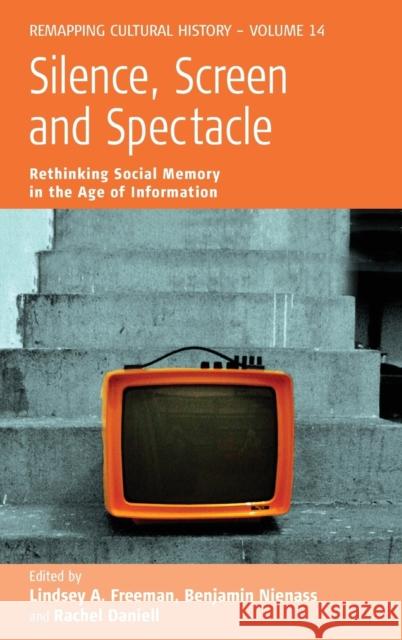Silence, Screen, and Spectacle: Rethinking Social Memory in the Age of Information » książka
Silence, Screen, and Spectacle: Rethinking Social Memory in the Age of Information
ISBN-13: 9781782382805 / Angielski / Twarda / 2014 / 260 str.
Silence, Screen, and Spectacle: Rethinking Social Memory in the Age of Information
ISBN-13: 9781782382805 / Angielski / Twarda / 2014 / 260 str.
(netto: 484,12 VAT: 5%)
Najniższa cena z 30 dni: 498,70
ok. 22 dni roboczych.
Darmowa dostawa!
In an age of information and new media the relationships between remembering and forgetting have changed. This volume addresses the tension between loud and often spectacular histories and those forgotten pasts we strain to hear. Employing social and cultural analysis, the essays within examine mnemonic technologies both new and old, and cover subjects as diverse as U.S. internment camps for Japanese Americans in WWII, the Canadian Indian Residential School system, Israeli memorial videos, and the desaparecidos in Argentina. Through these cases, the contributors argue for a re-interpretation of Guy Debord's notion of the spectacle as a conceptual apparatus through which to examine the contemporary landscape of social memory, arguing that the concept of spectacle might be developed in an age seen as dissatisfied with the present, nervous about the future, and obsessed with the past. Perhaps now "spectacle" can be thought of not as a tool of distraction employed solely by hegemonic powers, but instead as a device used to answer Walter Benjamin's plea to "explode the continuum of history" and bring our attention to now-time. Lindsey A. Freeman is an Assistant Professor of Sociology at SUNY Buffalo State. Her work concerns collective memory, nostalgia, utopia, space/place, atomic history, and art. She is currently at work on a book about the rise and decline of the Atomic Age which centers on the former secret atomic city of Oak Ridge, Tennessee, forthcoming from The University of North Carolina Press. Benjamin Nienass received his PhD from the Department of Politics at the New School for Social Research and is currently a postdoctoral fellow at the College d'etudes mondiales in Paris. His research is concerned with the politics of memory in postnational contexts, particularly in the European Union. Rachel Daniell is a doctoral student in Anthropology at The Graduate Center, CUNY, and was formerly the Associate Director of the Center for Human Rights and Peace Studies at Lehman College. Her research examines practices of documentation and representation around human rights violations committed by the United States in the "War on Terror."
In an age of information and new media the relationships between remembering and forgetting have changed. This volume addresses the tension between loud and often spectacular histories and those forgotten pasts we strain to hear. Employing social and cultural analysis, the essays within examine mnemonic technologies both new and old, and cover subjects as diverse as U.S. internment camps for Japanese Americans in WWII, the Canadian Indian Residential School system, Israeli memorial videos, and the desaparecidos in Argentina. Through these cases, the contributors argue for a re-interpretation of Guy Debords notion of the spectacle as a conceptual apparatus through which to examine the contemporary landscape of social memory, arguing that the concept of spectacle might be developed in an age seen as dissatisfied with the present, nervous about the future, and obsessed with the past. Perhaps now "spectacle" can be thought of not as a tool of distraction employed solely by hegemonic powers, but instead as a device used to answer Walter Benjamins plea to "explode the continuum of history" and bring our attention to now-time.
Lindsey A. Freeman is an Assistant Professor of Sociology at SUNY Buffalo State. Her work concerns collective memory, nostalgia, utopia, space/place, atomic history, and art. She is currently at work on a book about the rise and decline of the Atomic Age which centers on the former secret atomic city of Oak Ridge, Tennessee, forthcoming from The University of North Carolina Press.
Benjamin Nienass received his PhD from the Department of Politics at the New School for Social Research and is currently a postdoctoral fellow at the Collège détudes mondiales in Paris. His research is concerned with the politics of memory in postnational contexts, particularly in the European Union.
Rachel Daniell is a doctoral student in Anthropology at The Graduate Center, CUNY, and was formerly the Associate Director of the Center for Human Rights and Peace Studies at Lehman College. Her research examines practices of documentation and representation around human rights violations committed by the United States in the "War on Terror."











